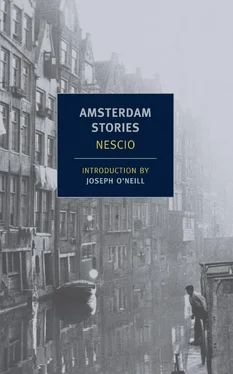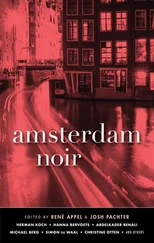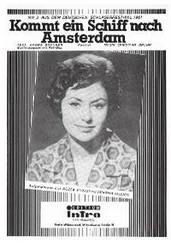I went down the front stairs. The client was standing at the window with his hands on his hips, legs spread wide, looking out at the street. He looked rich and well-fed. I respectfully doffed my hat to him and he returned the greeting, politely and graciously.
XII
I’m coming to the end now, slowly but surely. Thank God, someone will say. Ach, I knew before I started that this wouldn’t amount to much. What does the life of an Amsterdammer ever amount to, these days? When I was young there were so many times when I wished something would happen, anything. But nothing ever happened. We never even changed address. And later …
Only Hoyer knows what it all adds up to. He inherited some money, now he’s loaded. He’s a member of the Social Democratic Workers’ Party, and he reads The People .
In the evening he sits in the reading room and leafs through the Berlin Tageblatt . He doesn’t paint anymore. And he has a reason why he doesn’t paint too: it’s because we live in an age of decline. A new art is coming, he is sure of it, and waiting for it to arrive. Meanwhile, he brings Art to the People — how, I don’t know. A bricklayer asked him once: “What does all that nonsense get me?” Hoyer had an explanation for that too: “We Social Democrats know only too well….”
He says loads of things that are absolutely true, and when you start to think “Now this is getting interesting,” that’s when he stops. One afternoon in Café Poland he had a whole lot to say about “proletarian sentiment” and “bourgeois ideologies.” I just listened. One time I said to him, “It’s wonderful how you understand everything so well.”
At that he started right in again and I couldn’t get a word in edge-wise for half an hour. And it really is wonderful, to someone who has to do what other people tell him his whole life without understanding much about it himself, and who is constantly being snarled at and has to eat margarine and live in stuffy little apartments. If I was allowed to keep even the slightest doubt I would join the Social Democratic Workers’ Party too. One good thing, though: the people who always end up in stuffy apartments don’t need me. And maybe they’d manage, somehow, without Hoyer too. I should check if it is allowed: doubt.
Things went badly with the agency, sales on commission. The sales on commission part was total nonsense, Bekker had just put it there because it sounded good, and someone who has translated Dante and written poems, even if there were only thirteen of them, should not be an agent for domestic and foreign firms. On a rainy December day, with the lamps lit along the canal, I found Bekker leaning on his desk with his head on his hand. The room was half dark. He was motionless. I turned on the gaslight. There was three days’ mail, unopened, in the wastepaper basket behind him. He’d shoved the whole pile in with his elbow, deliberately, without looking at it. He had gotten rid of his employee months ago. They’d taken away his phone. There he sat. A list of steamship departures hung on the wall; the most recent one had long since returned and set sail again, several times. On the mantel was a thick book: a deluxe edition of the Divina Commedia .
The lamps were burning outside, pale and strange in the last light of day, like some unaccountable mistake. The way they so often did. Everything seemed like an unaccountable mistake.
Bekker is back working in an office now, with a good boss, who respects him for having translated Dante. On days when the weather is fine he lets Bekker leave early, so that he can walk around a bit in the sun.
Bekker didn’t turn to drink. He solves chess problems or sleeps. He has no vision of the future and no longings, not even for six o’clock. What good are they anyway? He takes a melancholy pleasure in collecting his salary, and a melancholy pleasure in using it to buy neckties and shoes. His clothes are properly brushed. Sometimes he feels a little pleased with himself for having “lived the life of the mind” once.
He still goes and looks at a painting every once in a while. I ran into him recently. He told me about The Arrival of Queen Wilhelmina at Frederiksplein , Eerelman’s painting, the one with the ad for ODOL mouthwash painted on it so naturally. Wouldn’t that be a lovely painting to hang in a fancy pharmacy, he said.
Kees is still working for the gas company and living in one of those stuffy little apartments I mentioned. He doesn’t know where they’ll find room for the next kid to sleep. The children are still small but in a year or two they’ll be squabbling every morning over the one faucet and the one bathroom, the way it always goes in District III neighborhoods. He struggles with what Hoyer calls “the chronic shortages in working-class households” and buys cigars only on Saturday nights. On Sunday he has to keep the children in line. He gripes about how he’d be doing so much better if he had only listened to his father sooner.
His wife is good to him. He gets a clean handkerchief in the middle of the week. But she wouldn’t awaken desire in anyone who isn’t used to her like Kees is. It was different six years ago.
In his father’s attic, where Kees used to have his “place,” his sisters’ underwear is hanging up to dry.
XIII
And Bavink?
In the battle against the “goddamned things,” Bavink lost, or surrendered. The things that wanted to be painted and then, when you thought “Well in that case it’ll have to happen,” turned out not to want to be painted after all. He was just starting to become famous when the struggle came to an end.
Two months after my return he came and told me, in a very calm voice, that he had cut his View of Rhenen to pieces. And so he had. The river, the mountain, the Cunera Tower, the blossoming apple trees, the red roofs of Rhenen, the chestnut trees with their red and white flowers, the brown beeches and the little windmill somewhere up on the mountain — into sixty-four identical rectangles 15 by 12 1/2 cm each, with a blunt penknife. It was hard work too.
The thing just wouldn’t stop pestering him. It was worthless, totally worthless garbage. He wanted me to tell him why anyone would paint. What’s the point? He didn’t know anything anymore. He stretched out his arm and waved it around. There, that’s where the things are. He hit his forehead with his fist. And here . They want to come out, but they don’t come out. It’s enough to drive you out of your mind.
Almost a year later I saw him at Centraal Station, seeing someone off on the eight o’clock train to Paris, a hairy guy with long black curls and a huge beard, more hair than man, and a high forehead with nothing behind it. The setting sun shone big and red, it was at the edge of the glass and metal roof, there was a reddish light in the windowpanes and the varnish on the train cars. Bavink was drunk. The train pulled away, slid out from under the station roof and curved to the left. As it turned, the light flashed brightly on the cars.
We strolled to the end of the platform. We came to a man with a signal lamp and I saw that as he passed us he looked at a conductor standing on another platform and made a drinking movement with his hand near his mouth. We stopped past the end of the roof and looked at the sun. “You see the sun, Koekebakker?” The sun was especially clear, right in front of us, close by, bigger and redder than I had ever seen it. It almost touched the rails, it didn’t flash brightly on things anymore, there was a dull glow only on the frosted windowpanes of the train shed to the right of the track.
“You think I’m drunk?” I did indeed. “It doesn’t matter, Koekebakker, when I’m sober I don’t understand anything anyway.”
Читать дальше



![Олеся Проглядова - Nomen nescio. Имя неизвестно [litres]](/books/391740/olesya-proglyadova-nomen-nescio-imya-neizvestno-lit-thumb.webp)








